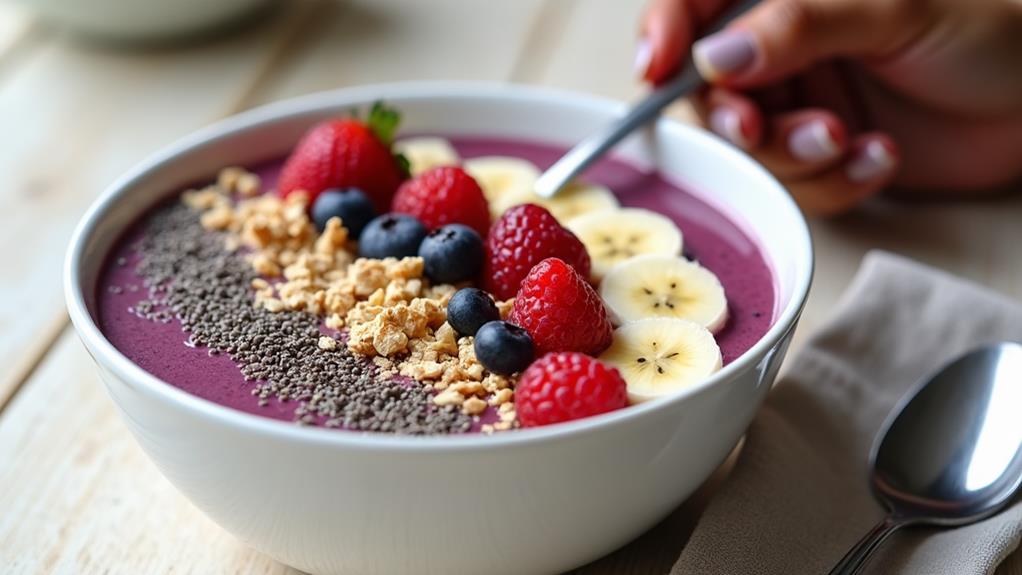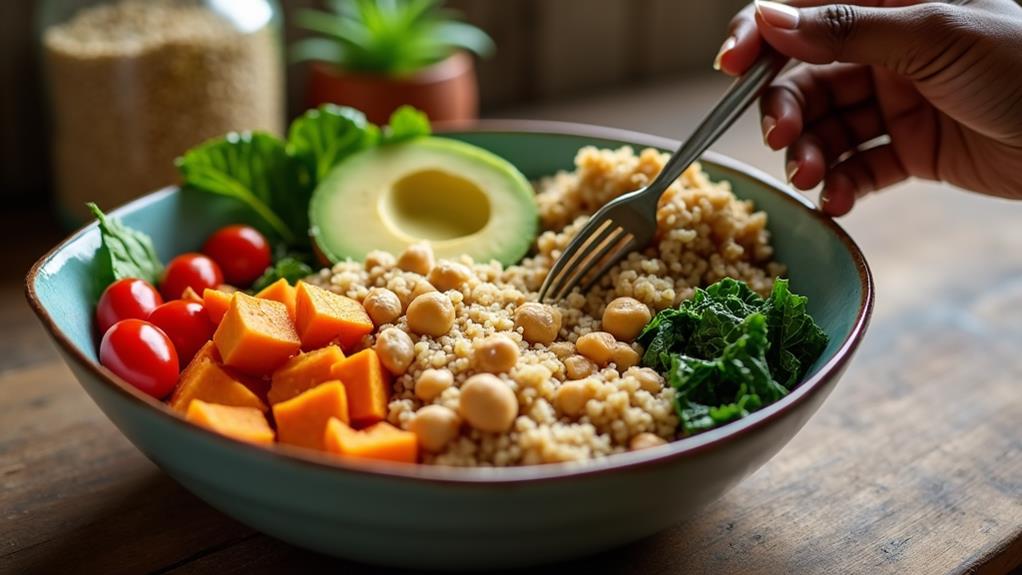You've probably heard about the benefits of plant-based eating, but you might be wondering where to start. "Nourish Your Roots" offers a thorough guide to embracing this lifestyle for peak health. It's not just about eliminating animal products; it's about nourishing your body with a diverse array of plant-based foods. From understanding essential nutrients to overcoming common challenges, this guide provides practical advice for your journey. Whether you're a curious beginner or looking to refine your plant-based approach, you'll find valuable insights that can transform your health and well-being. But what exactly makes plant-based eating so powerful?
Key Takeaways
- Plant-based diets focus on fruits, vegetables, whole grains, legumes, nuts, and seeds, rich in essential nutrients and fiber.
- Key nutrients to monitor include protein, omega-3s, iron, vitamin B12, calcium, and zinc, with supplementation sometimes necessary.
- Plant-powered diets can reduce chronic disease risk, improve heart health, and have a positive environmental impact.
- Transitioning gradually, meal planning, and educating oneself on plant-based nutrition are crucial for successful adoption.
- Diverse recipes and meal prep strategies help maintain a balanced and satisfying plant-based diet for long-term success.
Understanding Plant-Based Nutrition

Many people are turning to plant-based eating, but it's crucial to understand the nutritional aspects of this dietary choice. Plant-based diets focus on foods derived from plants, including fruits, vegetables, whole grains, legumes, nuts, and seeds. These foods are rich in vitamins, minerals, fiber, and antioxidants, which can contribute to improved health outcomes.
When adopting a plant-based diet, you'll need to pay attention to certain nutrients. Protein, often a concern, can be adequately obtained from sources like beans, lentils, tofu, and quinoa.
Essential fatty acids, particularly omega-3s, are found in flaxseeds, chia seeds, and walnuts. For iron, incorporate leafy greens, legumes, and fortified foods.
Vitamin B12, primarily found in animal products, may require supplementation or consumption of fortified foods. Calcium isn't limited to dairy; you can get it from leafy greens, fortified plant milks, and tofu processed with calcium sulfate.
Zinc is available in whole grains, nuts, and seeds. By diversifying your plant-based food choices, you'll guarantee a well-rounded nutrient intake and support your overall health.
Benefits of a Plant-Powered Diet
A plant-powered diet offers a wealth of benefits for your health and the environment. By focusing on fruits, vegetables, whole grains, legumes, nuts, and seeds, you'll naturally increase your intake of essential nutrients, fiber, and antioxidants. This shift can lead to improved heart health, reduced risk of chronic diseases, and better weight management.
You'll likely experience increased energy levels and improved digestion as your body adapts to this nutrient-dense way of eating. Plant-based diets are often associated with lower blood pressure, cholesterol levels, and inflammation markers, which can contribute to overall longevity.
Beyond personal health, your dietary choices can greatly impact the planet. Plant-based eating typically requires fewer resources and produces less greenhouse gas emissions compared to animal-based diets. You'll be reducing your carbon footprint and supporting more sustainable food systems.
Additionally, you may find that a plant-powered diet enhances your culinary creativity. You'll discover new ingredients, flavors, and cooking techniques as you explore the diverse world of plant-based cuisine. This can lead to a more varied and exciting approach to meal planning and preparation.
Essential Plant-Based Food Groups

The foundation of a plant-based diet rests on several essential food groups that provide a wide range of nutrients. To guarantee you're getting all the necessary vitamins, minerals, and macronutrients, focus on incorporating these key plant-based food groups into your meals:
- Fruits: Rich in vitamins, antioxidants, and fiber, fruits offer natural sweetness and variety to your diet. Include a rainbow of options for ideal benefits.
- Vegetables: Packed with essential nutrients and low in calories, vegetables should form the bulk of your meals. Aim for a diverse mix of leafy greens, cruciferous veggies, and colorful options.
- Whole grains: These provide complex carbohydrates, fiber, and B vitamins. Choose options like quinoa, brown rice, and oats for sustained energy.
- Legumes: Beans, lentils, and peas are excellent sources of protein, fiber, and minerals. They're versatile and can be used in various dishes.
- Nuts and seeds: These offer healthy fats, protein, and important minerals. Incorporate them as snacks or add to meals for extra nutrition and texture.
- Plant-based proteins: Include tofu, tempeh, and seitan to boost your protein intake and add variety to your meals.
Meeting Nutritional Needs
Ensuring adequate nutrition on a plant-based diet requires careful planning and attention to key nutrients. You'll need to focus on protein, iron, vitamin B12, calcium, vitamin D, zinc, and omega-3 fatty acids. These nutrients are often more abundant in animal products, but you can obtain them from plant sources with some effort.
Protein is available in legumes, nuts, seeds, and whole grains. For iron, consume leafy greens, lentils, and fortified cereals, pairing them with vitamin C-rich foods to enhance absorption.
Vitamin B12 is essential, so consider fortified foods or supplements. Calcium can be found in leafy greens, fortified plant milks, and tofu processed with calcium sulfate. For vitamin D, rely on sunlight exposure and fortified foods.
Zinc is present in whole grains, legumes, and nuts. Omega-3s are available in flaxseeds, chia seeds, and walnuts, though you may need an algae-based supplement for ideal levels.
Transitioning to Plant-Based Eating

Moving from nutrition to practical implementation, let's explore how you can shift towards plant-based eating. Start by gradually replacing animal products with plant-based alternatives. Swap cow's milk for almond or oat milk, and try plant-based meat substitutes in your favorite recipes. Experiment with new fruits, vegetables, legumes, and whole grains to diversify your diet.
Plan your meals ahead of time to guarantee you're getting all necessary nutrients. Stock your pantry with plant-based staples like beans, lentils, nuts, and seeds. Learn to read food labels carefully, avoiding hidden animal products in processed foods.
When dining out, look for restaurants with plant-based options or ask for modifications to existing menu items. Don't be too hard on yourself if you slip up occasionally. Shifting to a plant-based diet is a journey, not an overnight change. Set realistic goals and celebrate small victories along the way.
Educate yourself about plant-based nutrition through reliable sources, and consider consulting a registered dietitian for personalized advice. Remember, the key to successful change is finding plant-based foods you genuinely enjoy and making sustainable adjustments that fit your lifestyle.
Meal Planning and Prep
Successful plant-based eating hinges on effective meal planning and preparation. Start by creating a weekly meal plan, focusing on a variety of fruits, vegetables, whole grains, legumes, nuts, and seeds. Consider your nutritional needs, taste preferences, and schedule when selecting recipes. Make a thorough grocery list based on your plan to guarantee you have all necessary ingredients on hand.
Dedicate time each week for meal prep. Wash and chop vegetables, cook grains and legumes in bulk, and prepare sauces or dressings in advance. Store these components in separate containers for easy assembly throughout the week. Invest in quality storage containers and label them with contents and dates to maintain freshness and reduce waste.
Explore batch cooking techniques to maximize efficiency. Prepare larger quantities of soups, stews, or casseroles that can be portioned and frozen for future meals.
Don't forget to include grab-and-go options like overnight oats, energy balls, or pre-packed smoothie ingredients for busy mornings. By planning and prepping ahead, you'll save time, reduce stress, and increase the likelihood of sticking to your plant-based eating goals.
Plant-Based Recipes for Beginners

With your meal planning and prep strategies in place, it's time to explore some simple yet delicious plant-based recipes.
Start with a hearty breakfast smoothie bowl, combining frozen berries, banana, spinach, and plant-based milk. Top it with chia seeds, nuts, and granola for added texture and nutrition.
For lunch, try a quinoa and black bean salad. Mix cooked quinoa with canned black beans, diced bell peppers, and corn. Dress it with lime juice, olive oil, and cilantro for a revitalizing meal.
Dinner can be as easy as a lentil and vegetable curry. Simmer red lentils with coconut milk, diced tomatoes, and your favorite curry powder. Add in chopped vegetables like carrots, cauliflower, and spinach for a nutrient-packed dish.
Don't forget about snacks. Homemade hummus paired with carrot sticks and cucumber slices makes for a satisfying afternoon pick-me-up.
For a sweet treat, blend frozen bananas with a splash of plant-based milk for a creamy "nice cream" dessert.
These beginner-friendly recipes will help you shift to a plant-based diet while enjoying flavorful, nutritious meals.
Overcoming Common Challenges
Shifting to a plant-based diet can present some hurdles, but they're not insurmountable. One common challenge is feeling overwhelmed by the change. Start small by incorporating one plant-based meal a day and gradually increase over time. You'll find it easier to adapt as you discover new recipes and flavors.
Nutrient deficiencies are another concern. Make sure you're getting enough protein, iron, and vitamin B12 by including a variety of legumes, nuts, seeds, and fortified foods in your diet. Consider taking a B12 supplement if needed.
Social situations can be tricky. Communicate your dietary choices to friends and family, and offer to bring a dish to gatherings. When dining out, research menus in advance or call restaurants to inquire about plant-based options.
Cravings for familiar foods may arise. Explore plant-based alternatives to your favorite dishes or find new recipes that satisfy similar flavor profiles. Remember, your taste buds will adapt over time.
Lastly, don't be too hard on yourself. Perfection isn't the goal; progress is. Every plant-based meal is a step towards a healthier you and a more sustainable planet.


